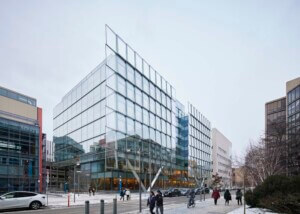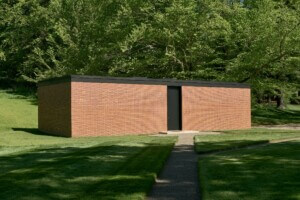We’ve been following Chicago’s Olympic bid rather closely of late, and not only because we’re on the way to inaugurating a Midwest edition of the paper. First, there was SOM’s intriguing proposal to create “sustainable,” “low-impact” Olympics that would have few legacy costs by using temporary facilities, an approach the IOC apparently favored. Then there was the impact of that plan, which still called for the demolition of some buildings—as well as hundreds of trees in Washington Park—most notably at the Walter Gropius-designed Michael Reese hospital campus. Outcry from preservationists led the city to delay demolition, which made time for the preservationists to develop alternative plans. Olympic opponents may be catching another break now, as, ironically enough, the very things the IOC purportedly liked about Chicago’s bid-lite may also be its undoing.
The IOC released its evaluation report today, which outlines the strengths and weaknesses of of each city’s bid a month in advance of the final selection. In addition to Chicago, Rio de Janeiro, Tokyo, and Madrid are vying for the games. Reports indicate the South American city could be the favorite, while Chicago’s proposal was called “ambitious,” which sounds like damning praise, with the Tribune doing a good job of highlighting the curious position the IOC has laid out:
A risk highlighted for Chicago’s bid, the planned use of many temporary venues, reflects an IOC desire to have its cake and eat it, too.
Based on the 2003 report of a Games study commission, the IOC espouses the idea of not wanting host cities to build expensive, permanent venues that will become underused, costly-to-maintain white elephants. Yet it also is thrilled when a city like Beijing goes overboard to do just that.
In its detailed evaluation of the Chicago bid’s response to the 17 themes assessed, the report praises the city’s concept for being “in line with the IOC Games Study Commission recommendation to `build a new venue only if there is a legacy need…”’
In the same sentence, the report says that means a greater burden on the Olympic organizing committee (OCOG) to pay for and deliver that part of the project, as opposed to cities that build permanent structures and do not assign their cost and development to the Games operations (OCOG) budget.
In its summary of the Chicago bid, the report says there is increased risk in Chicago due to an “emphasis on major temporary or scaled-down venues.” That includes the Olympic Stadium, which would be a temporary, 80,000-seat structure.
Chicago bid officials have insisted their venue plan not only is financially responsible but could be a model for future Olympic host cities.
Clearly, cost is a concern, especially in these economically challenging times. Still, the ambivalence the IOC has for what exactly it wants is amusing, if not downright frustrating. That is, of course, unless you’re a preservationist wanting nothing to do with the current Olympic bid.
Oh, and guess what else is a concern? The weather, of course. Or, as only the FT could put it, “meteorological shortcomings.” (h/t ArchNewsNow)










